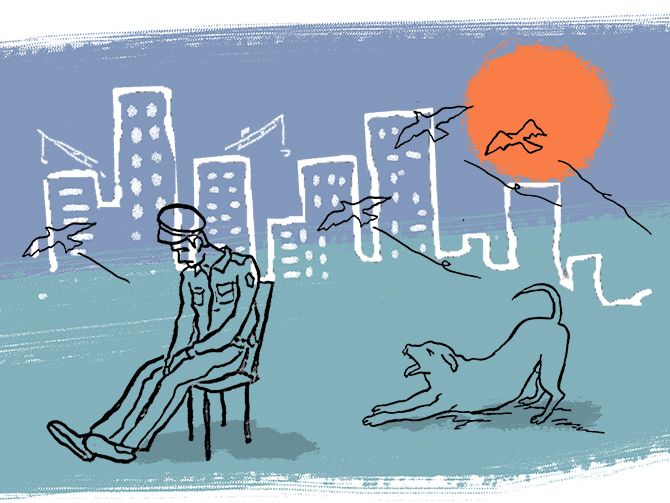Mumbai metropolitan region, comprising Mumbai city, Navi Mumbai and Thane, leads the pack (in delayed projects) with 210,000 units at an approximate valuation of Rs 2.34 trillion.
Illustration: dominic Xavier/Rediff.com

Homebuyers of the Amrapali Group may have got some respite after the Supreme Court (SC) judgment, but thousands more await resolutions.
Nearly 576,000 units across major cities continue to be delayed while 174,000 of these have completely been stalled, shows the data from Anarock Research.
Mumbai metropolitan region, comprising Mumbai city, Navi Mumbai and Thane, leads the pack (in delayed projects) with 210,000 units at an approximate valuation of Rs 2.34 trillion.
The number of delayed units are 200,000 for the National Capital Region (NCR), which are worth Rs 1.26 trillion.
Among the cities, Mumbai has the largest number of delayed units -154,000 - worth Rs 2 trillion while Greater Noida is at the second spot with 100,000 delayed units valued at Rs 43,500 crore.
The NCR satellite towns - Noida (42,500 units), Ghaziabad (23,000) and Gurugram (22,000) - are among the worst hit in the ongoing slump in project completion.
According to Anuj Puri, chairman, Anarock Property Consultants, majority of the projects launched by enthusiastic developers in the western parts of Greater Noida are now stuck under various stages of non-completion.
“Real estate activity in Greater Noida boomed on the claim of boosted connectivity to Yamuna Expressway which passes through this region.
"Developers cashed in on the connectivity prospects and launched innumerable projects over the years,” said Puri.
Experts said Tuesday’s SC verdict, which had an emphasis on delayed or stalled projects in the NCR region, might have an overarching impact on hundreds of unfinished projects in the region.
“The verdict, which is in favour of buyers, will serve as a deterrent to other possible defaulters,” said Gulam Zia, executive director - valuation & advisory, retail & hospitality - Knight Frank India.
“While similar developments with regard to other stuck projects are awaited, SC has now set a precedent with a resounding message - comply or perish - through the landmark judgment,” said Puri.
According to Rajat Prakash, managing partner, Athena Legal, the apex court’s order of handing over complete units to buyers, instead of offering refunds, is in the right direction.
“The same procedure can be adopted for other such cases as well to ensure that the sector, which is struggling at the moment, is brought back on track,” he said.
Data shows the NCR has the largest pile-up of stalled units with 118,000 homes (68 per cent of the total stuck units) spread over 67 projects with an overall value of Rs 82,200 crore.
Of these, nearly 69 per cent (or 83,470 units) are already sold out.
Noida and Greater Noida together house 98 per cent of the stuck projects in the NCR.
Almost 66 per cent of the total 174,000 stalled units or 115,000 homes across the country have already been sold to buyers who have been left in the lurch - at the mercy of either the concerned developers or law of the land.
The net estimated value of these sold units is approximately Rs 1.1 trillion.
However, completion and delivery of homes to the buyers of various Amrapali projects may not be easy.
Executives from major developers that Business Standard spoke to pointed towards roadblocks ahead.
The recovery of funds that were siphoned off by Amrapali’s promoters, attachment and auctioning of assets of the promoters by the Enforcement Directorate and monetisation of Amrapali’s remaining assets are some hurdles that have to be crossed before NBCC begins development work.
“NBCC would require thousands of crores to complete these projects.
"While due payments by home buyers will cover a part of it, the rest has to be recovered by agencies and authorities, which may take a while,” said a senior executive from a major developer.
Moreover, some experts said the diverse nature of the problems in delayed or stalled projects may complicate the matter.
According to Zia, the order can’t be taken as a template for all such resolutions since each of these cases would have issues such as cost, pending collections from home buyers, and government charges.
With inputs from Aashish Aryan












 © 2025
© 2025